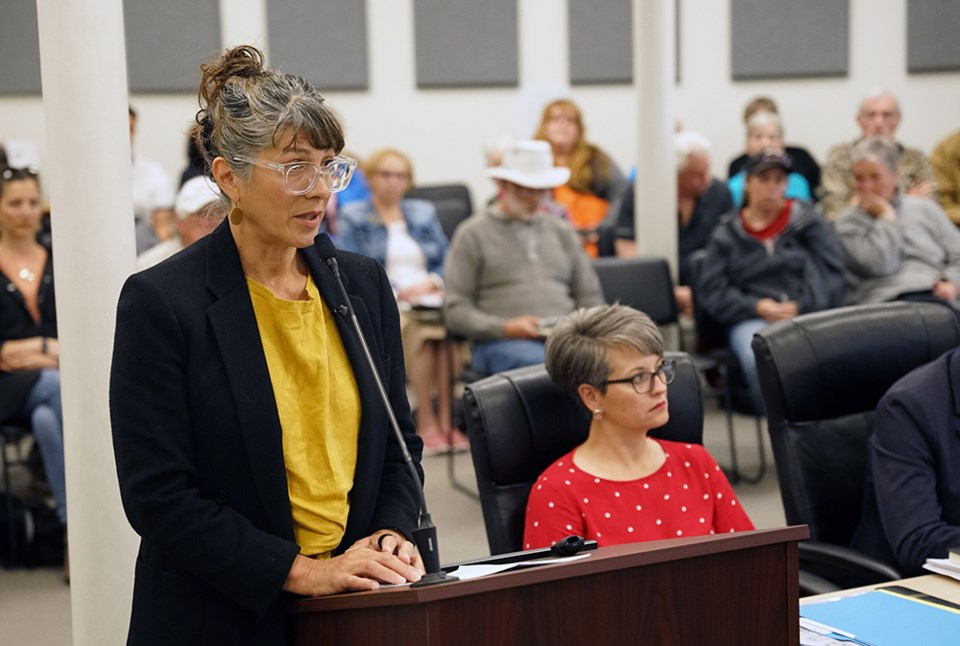City of Powell River councillors were provided perspectives on reconciliation from resident Claudia Medina, who outlined her thoughts on responsibilities for people born and raised here.
At the June 4 committee of the whole meeting, Medina said she was speaking as an individual community member and not representing any group.
“However, I do know that my words today reflect the feelings of many people,” said Medina. “One of the main reasons I was compelled to come and speak today is because I have heard previous delegations have said a lot about the rights of being born and raised here, implying that those who aren’t, including those in governance, have limited rights to have a say in what happens here.”
Medina said she would like to address this and offer another perspective by saying that rather than giving her more rights as someone who was born and raised here, it actually heightens her responsibility to this beautiful region, which is fundamentally Tla’amin Nation territory. She said she was born in the old hospital that was built on the lands also known as Tis’kwat.
“For most of my life living in town, I only knew it as the Townsite, the original town where the mill was built, and the dam was built,” said Medina. “My parents moved to this country in the late ’60s, my father worked in the mill for over 30 years, providing for his family. My grandfather also worked in the mill for a time, sending money back to his family in Italy.
“I also worked in that mill as a summer student, which helped me get through university. Growing up, I didn’t learn anything about the story about what was there before the mill. It was as if the mill had magically appeared and the town was born.”
Medina said throughout her experience in elementary and high school there was little to no mention about the thousands of years of history, culture and language of the Tla’amin people. She said there was most definitely nothing about the ongoing history of systemic condemnation through government policy.
“We didn’t learn anything about residential schools,” said Medina. “We didn’t learn why the town was named Powell River or who even Powell was. I did, however, grow up feeling there was a kind of unspoken segregation, and it wasn’t until much later that I learned segregation was an actual enacted policy here.”
Medina said it wasn’t until she moved back to this community in 2010 that she started to learn the full story of how the mill came to be, the process of expropriation of the Tla’amin land that came to be known as Lot 450, and the relentless and ongoing policies that attempted to erase Tla’amin culture, and systemic attempts to hide this history from the collective minds of people here.
“Learning this does not in any way erase my history here,” said Medina. “Learning this does not erase or undermine the history of my family. However, learning about this history and the harms and injustice caused by the establishment of the mill and the town does give me a responsibility, which is to learn from the truth of the past, and find ways for healing and rebuilding relationships, and doing whatever possible to address the wrongs of the past through meaningful action. This is the essence of reconciliation.”
Medina said for herself and others, being born and raised here means being committed to reconciliation with Tla’amin Nation. She said it doesn’t give the right to deny the truth or reinforce the harms of colonization.
“It’s important to highlight that no matter how recently one has come to live here, as members of this community, we all have something to offer and contribute to this place and we all have so much to learn,” said Medina. “With regard to statements made by previous delegations representing the Concerned Citizens of Powell River, I feel it is necessary to emphasize that despite the constant refrain of this small group that they are speaking on behalf of the citizens of this town, myself and many others do not include ourselves in their fearful and negative rhetoric that has only been intensified.”
Medina said she and many others have been shocked and appalled witnessing the hateful rhetoric from this group.
She said as a filmmaker, she has been entrusted to record the stories of residential school survivors. When she thinks of their enormous courage and their wanting to share what they endured; the unfathomable generosity of spirit to relive their traumas so that people can understand the truth of what happened, it sickens her to hear people stand up in council chambers and attempt to justify or downplay one of the most shameful chapters of this country’s history.
Join the Peak's email list for the top headlines right in your inbox Monday to Friday.



